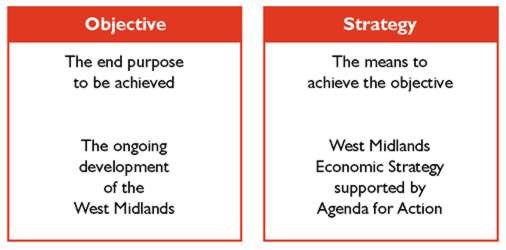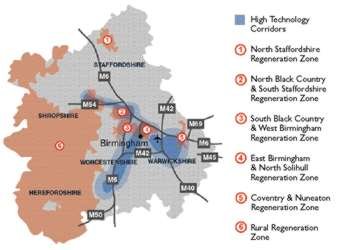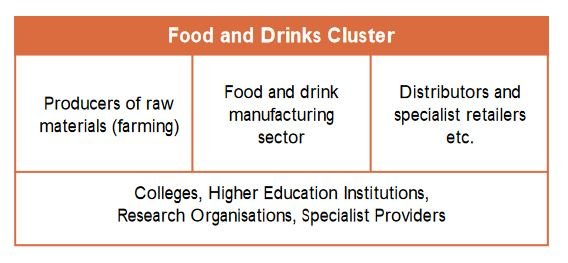
The economy of the UK has experienced a dramatic change in recent years as a result of both:
• demand factors – modern consumers want different goods than those bought by previous generations
• supply factors – the way in which products are made today is different, and there is far greater competition from across the globe to supply modern markets.
The economic fortunes of different UK regions fluctuate over time. Areas that were once dynamic centres of industry can lose their vitality, as a result of changes in demand/buying patterns over time, or as new competing regions develop. At the same time, new growth poles develop. Today businesses operate in a global rather than a regional or national economy. Competitors for firms in Birmingham are no longer just those in Solihull and further afield in Manchester; instead, they may be in Germany, the USA, or China
This case study examines how one of the UK’s most important regions, the West Midlands, with a long history of industrial innovation is undergoing development and regeneration in order to meet these changes in demand and supply and to consolidate its position at the heart of the UK economy. The West Midlands lies at the centre of the United Kingdom. It is the country’s manufacturing and agricultural heartland and the hub of the transport system. The region remains closely associated with innovation and change.
The development of the West Midlands
The West Midlands has a proud industrial history, being the birthplace of the Industrial Revolution in this country; iron and steel, bicycle and motor vehicle manufacture, the rail and aircraft industries, all forms of engineering, pottery and many others. These industries are still important, as are the skills of the people involved, but today we live in a more diverse economy, in which:
- the new industrial age of the microchip has transformed
- industrial processes
- services are as important as manufacturing
- women make up 50 of the workforce.
The way we make goods today is different from in the past and the type of goods required by the market has changed.
The West Midlands has a number of existing strengths to build on, including:
- it is the UK’s manufacturing ‘capital’ – with a wide variety of global brands and world-class firms
- there are excellent universities and numerous research establishments to fuel the commercialisation of innovation and creativity
- it is a cosmopolitan region with vibrant, multi-ethnic and multi-faith communities
- there is a broad range of cultural and sporting ‘icons’ like the Royal Shakespeare Company, the City of Birmingham Symphony Orchestra, The Ryder Cup at the Belfry and the Ironbridge World Heritage site
- at its heart lies the international city of Birmingham, along with Birmingham International Airport and the National Exhibition Centre (NEC)
- the central UK location makes it attractive to businesses serving the rest of the UK and overseas markets.
Advantage West Midlands – RDA

The present government recognises the importance of economic management of the various regions of the country, steered by local people accountable to locally elected regional bodies and supported by central government, as well as an overall framework for the development of the European Union. Funds for regional development are provided by:
- the European Union
- European Union
- the UK government
- local authorities.
The process of regenerating the West Midlands is being coordinated by Advantage West Midlands one of the eight Regional Development Agencies (RDAs) created in England by The Regional Development Agencies Act, of 1998. A ninth; the London Development Agency, was created in 2001.
A Development Agency is a body corporate and can have between 8 and 15 Board members. The Secretary of State responsible for regional development decides the Chair of each RDA.

- further economic development and regeneration
- promote business efficiency, investment and competitiveness
- promote employment
- enhance the development and application of skills relevant to employment
- contribute to the achievement of sustainable development.
An RDAs role relates to both the rural and non-rural parts of its area.
RDAs are expected to create strategies for the development and regeneration of their area and to review these strategies continually with guidance from the relevant Government Minister. RDAs are expected to consult with locally elected regional chambers and are financed through government grants, borrowing and loans.
Advantage West Midlands is the champion for economic regeneration acting with its partners as a catalyst for change to address the challenges and opportunities that the West Midlands faces in a global economy. Ultimately, the Agency provides regional leadership, investment and action to create more, better jobs and improve the quality of life in the West Midlands.
Advantage in action
Advantage West Midlands has led the development of a strategy for the economic regeneration of the West Midlands. Strategies are long-term plans which set out the means of achieving chosen objectives, in this case, economic regeneration. The Agency works with a broad range of partner organisations to implement the strategy and deliver its objectives.

The Government has recently identified opportunities to create directly elected regional assemblies in those regions that want them, and in doing so created the scope to devise tailored regional solutions to regional problems. The thinking behind this is that the needs of local areas are best served when development is steered and accountable to local representative bodies. The West Midlands Regional Assembly was formerly known as the West Midlands Regional Chamber.

To translate the economic strategy into specific actions that would deliver economic regeneration, Advantage West Midlands published Agenda for Action. This strategic document was agreed upon between the Agency and the then West Midlands’ Regional Chamber on 26 April 2001. Agenda for Action clearly sets out the means to deliver the
Regional Economic Strategy. The Agenda defines the significant, priority actions that partners in the region have agreed will deliver the West Midlands Economic Strategy. The Actions outline how to make the best use of around £30 billion. These are the total resources estimated to be available for economic regeneration over the next 10 years.
Creating conditions for growth
The Agenda for Action outlines priorities for the first three years of the plan and establishes three main focuses for action that relate to the targeting and concentration of resources. These focuses are:

- Regeneration Zones
The Agency has targeted its investment in six ‘Regeneration Zones’. These are parts of the West Midlands where there is the greatest need and opportunity for regeneration. Zone partnerships have been established to drive forward the regeneration process and ensure that real improvements are made over the next 10-12 years. The six Regeneration Zones cover roughly one third of the region’s population, half of its unemployed and nearly three fifths of its long-term unemployed. The Zones include strategic land and sites where there are attractive development opportunities. The Zones provide strong contrasts between the most remote rural parts of the region (Marches) and inner urban areas (East Birmingham and Coventry). Detailed action plans have been drawn up for each Zone on the basis of local need with input from businesses and the community.
Working in partnership

The Zones are working through forums of partnerships, which encourage people to work across traditional boundaries and develop new relationships. Leadership in economic development has to be shared among a number of organisations, each contributing where they can best add value, rather than duplicating effort.
- Clusters
A second area where the Agency concentrates its efforts is to develop ‘business clusters’. Clusters are groups of businesses and related organisations linked through a common technology or an end product. They include suppliers and specialist educational institutions, involved with industry (or cluster) – related training and research. The 10 clusters that have been identified as being most relevant to the ongoing development of the West Midlands, and are split into:
- Established clusters: e.g. food and drink and transport technologies. The emphasis here is helping these clusters to diversify and modernise.
- Growing clusters: e.g. information and communication technology, environmental technologies. These are already showing signs of growth.
- Embryonic or aspirational clusters: e.g. Interactive media for education and entertainment, medical technologies. These are good prospects for growth.
Stimulating the growth of these clusters involves:
- identifying market opportunities through market research
- encouraging collaborative efforts within clusters e.g. skills development, sharing of research efforts, etc.
For example, the illustration below illustrates the Food and Drinks Cluster:

The Food and Drink Cluster employs about 60,000 people and includes:
- agricultural commodity supply e.g. potatoes and dairy products
- processing of these commodities e.g. into ready meals
- key confectionery industry with world famous names like Cadbury, wholesaling of foodstuffs, distribution
- production of agricultural machinery.
This cluster was chosen because it is one of the major employers and is experiencing growth in employment. Consumer tastes are continually changing and food safety is a major concern. Working together as a cluster, firms can build on new opportunities such as the growth in demand for ethnic foods.
The Transport Technologies cluster is perhaps the most important in the West Midlands employing about 175,000 people. It includes commodity manufacture of metal and polymer components, metal processes/ treatments, electrical/electronic/mechanical subsystems and vehicles. There are high concentrations of activity including the Jaguar plant at Castle Bromwich.
This cluster is identifying opportunities for focusing on higher value added activities, based on new technologies and in luxury cars, motorsports and materials to improve products through design. There are many opportunities for technology transfer between different modes of transport and also in the use of new materials that lessen environmental impact.
- High technology corridors
Advantage West Midlands has identified three ‘high technology’ corridors, which provide opportunities to diversify the economic base of the region. These corridors are areas where the Agency is working with partners and concentrating efforts so that more high technology companies locate and expand in the region.
The corridors have two common characteristics:
- The potential to attract and develop more high tech businesses by virtue of the presence of universities, research institutions or property opportunities.
- Location in areas heavily dependent on the automotive sector – many of Rover’s suppliers are located in these parts of the region.
A strategy has been identified for each corridor along with a number of potential projects to help take forward cluster development and support the high technology industry.
Conclusion
Regional development and regeneration lie at the heart of a vibrant UK economy. Advantage West Midlands is the regional champion working on behalf of the region to secure funding and investment and influence policy and perceptions of the region. It is a regional catalyst bringing others together to deliver actions of regional significance. It is also a regional coordinator acting as a shaper, influencer and encourager, using its funding and strategies to steer development and regeneration in the region.
In this case study, we briefly outlined two of the clusters in the West Midlands. To find out more about these and the other 8 clusters, please access the website: www.advantagewm.co.uk
